2021 Annual Report
A year that brought the disparities of the system into stark relief

Anita Khandelwal
Anita Khandelwal reflects on this past year
It is a somewhat disorienting experience to look back at this department’s annual report from 2020—to remember how we marched with our neighbors, the collective energy for change, and the commitment to protect Black lives. Even though little has changed since those marches, the energy in our wider community is not the same. In many ways our clients face a worse environment now than they have in years.
The work of our department, though, is stronger than it has ever been. Our staff continues to stand for the humanity of our clients, regardless of shifting political winds. In 2021, we represented nearly 15,000 clients in nearly 20,000 cases, and I am incredibly proud of the work we have done this year.
While we have had many successes—and this report will discuss them—I want to take an opportunity to acknowledge the efforts we have made that have not produced the outcomes we wanted. In public defense, we know that we must celebrate those efforts because the profoundly racially disproportionate systems in which we work control the outcomes.
Our defense teams have fought hard for the release of clients who ended up in pretrial incarceration. We tried cases for clients, some of whom ended up with criminal convictions and long prison sentences. We sought shorter sentences for clients who are young adults, but the court sometimes imposed lengthy sentences. We could not stop the state from taking away some of our clients’ children. Even as we tried to slow the machinery of systems premised on dehumanizing our clients, we did not always succeed.
We also had an ambitious legislative agenda—an agenda that would have mitigated some of the harms of the criminal legal system on our clients. We were not able to advance that agenda. We tried to advance legislation that would change, and largely eliminate, the use of juvenile convictions to lengthen sentences that our adult clients are facing. We pushed to reduce the use of sentencing enhancements for those convicted of drug crimes in school zones. We worked to eliminate sex offender registration for young people (in the hope that doing so would lay the ground work for eliminating it for adults). We also worked to pass legislation that would stop the state from terminating the rights of parents whose children faced no prospect for adoption.
Finally, throughout this year we have continued to see poverty, addiction, and mental illness prosecuted as crimes. Notwithstanding our repeated efforts to demonstrate that the criminal legal system is incapable of addressing these social ills, we saw a recommitment to prosecution. We saw investments in the criminal legal system rather than in housing, treatment, and other efforts to meet our clients’ basic needs.
All of our efforts, successful or not, have been grounded in what we have learned from our clients. We have heard our clients’ stories and talked them through some of the most difficult moments of their lives. Our commitment to mitigating the harms of systems that ensnare our clients is not based in starry-eyed optimism; rather, our commitment is what have gained by seeing and understanding more of our clients’ lives than any other actor in this system.
That is why I am sure our advocacy will only improve and that we will one day convince others of our views. We know something true—our clients’ lives matter—and eventually others will see it, too.
What does aggressive advocacy look like? Some highlights from 2021
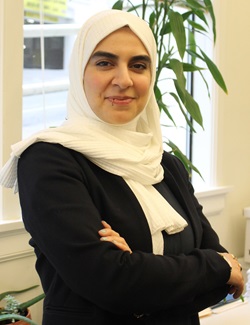
Safa Peera, an attorney at DPD, fought to have clients appear in person before a judge.
During another year of a global pandemic – a pandemic that affected poor, marginalized, and BIPOC communities disproportionately – our defense teams fought hard on behalf of clients.
They took cases to trial, sometimes having to do the entire trial by Zoom, other times only jury selection. They stood next to clients in arraignments and pre-trial hearings, while judges and prosecutors watched via video, three floors away. They worked to get clients released, many of whom languished pre-trial in jail for weeks, often in solitary-like confinement during COVID outbreaks.
“No matter which way the wind is blowing, a good lawyer tacks accordingly,” said Zac Franz, a supervising attorney. “I’ve been very impressed by our lawyers’ ability to do so in these challenging times. They’ve achieved some great outcomes, even in the face of countless barriers.”
Here are a few examples of our work.
Fighting for in-person appearances for in-custody clients
Several of our felony attorneys fought for the right for in-custody clients to appear in person before a judge, rather than having the judge and prosecutor in another courtroom, viewing the client on a large screen.
Safa Peera was one such attorney who challenged this arrangement, instituted as part of the pandemic response in Superior Court. She argued that it violated her clients' right to an in-person hearing, the appearance of fairness doctrine, and their right to be presumed innocent. She objected on the record countless times, filed several motions, and took once case up on appeal.
"The pandemic gave rise to novel issues that required the system to adapt, and unfortunately the choices made were detrimental to our clients. The people we represent became less visible this past year; they faced a more dehumanizing system," Safa said. "Attorneys at DPD have worked hard to push back, and we continue to do so. We continue to fight to prevent these new practices from becoming routine – because if they do become the norm, I fear that our clients will face an even harsher system and their rights will further erode."
Safa and other attorneys will continue to fight this battle, a set-up that harms our clients. “These are life-changing experiences for our clients, with serious consequences on the line,” she said.
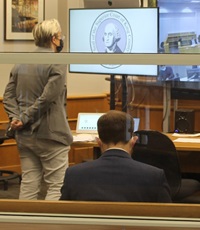
DPD attorney Amy Parker argues on behalf of a client via a video platform; the judge was in a courtroom three floors away.
Getting SMC to stop issuing ‘off-the-record’ warrants
Attorney Josh Kellemen last year began raising objections to Seattle Municipal Court’s use of off-the-record warrants – warrants issued without a hearing and without making factual, case-specific finding. The practice, he told judges, violates one of the State Supreme Court’s emergency orders, which makes clear that bench warrants can be issued only if the facts support the warrant and those facts are recorded in open court. Some judges listened. Some were openly hostile. “They didn’t want the calendar slowed down,” he said.
Facing resistance, he brought the issue to the Director’s Office, and Anita Khandelwal sent first a letter asking the court to stop these warrants and then a writ that we planned to file to force the bench to comply with the State Supreme Court’s emergency order. SMC’s presiding judge promptly agreed to stop, noting the court had issued 169 such warrants since February 2021 and that he has ordered all of them to be quashed and the cases reset for an upcoming intake calendar.
Advocating for clients in need of competency evaluations
When the pandemic hit the Seattle region, state psychologists – charged with the responsibility of evaluating clients who appeared not competent to go to trial – began to refuse to enter the jails to undertake these critical evaluations. Throughout 2021, Leslie Somerstein, a felony attorney at DPD, challenged this issue – over and over and over again.
Their refusal created a Hobson’s choice for attorneys. State evaluators were willing to conduct their evaluation in one of the jail’s visiting booths – with a glass partition between them and the client – but there wasn’t room in the booth for the attorney as well. So if the attorney wanted to attend, the evaluator would refuse to conduct the evaluation in-person. Instead, the attorney was expected to go into a meeting room in the jail, sit next to their client, and use a laptop to set up a video visit between the client and the evaluator.
Neither situation worked well, Leslie said. It’s important for attorneys to attend these critical evaluations; but it’s also important for the evaluator to be present and in-person – so that they can more fully see and hear the client and better understand their mental health condition.
The evaluation process also slowed way down as a result of the state psychologists’ refusals to enter the jail. This meant that clients, many of whom were experiencing extreme mental health issues, sat untreated in the jail for weeks and weeks, Leslie said. “The impact on our clients was horrible.”
Leslie filed motions asking the court to compel the evaluators to come to the jail. She raised the issue at countless court hearings. One judge was sympathetic, another judge refused to weigh in on what she called “state policy.” Leslie, as well as other attorneys, continues to fight this issue.
Changes in family defense law help to empower parents, strengthen families
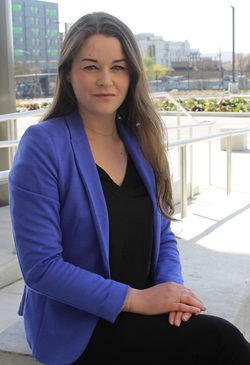
Elysia Ruvinsky, an attorney at DPD, says changes in the law have helped her families.
In 2021, DPD led statewide efforts to fundamentally transform dependency law in Washington state, using our expertise and proximity to these harmful systems to inform a broader law reform strategy. Our work representing our clients has shown us the degree to which this area of law is premised on outdated and inaccurate information about what is “best” for children that deeply harms families of color. Our experience informs out strategy as we look for ways to challenge and disrupt a status quo that disproportionately harms Black and Indigenous families.
What follows is a look at some of the significant accomplishments that took place in 2021 – legislative and appellate work that affected almost every aspect of this system and that were brought into sharp focus in the courtroom, where our frontline attorneys used their advocacy skills to ensure these changes were implemented.
Amy King, a family defense attorney, said she has seen first-hand what these changes have meant for her clients. “It’s given my clients a feeling that they have a chance,” she said, “as though the court is actually seeing them and considering them.”
Legislative work
DPD, as part of a coalition called Keeping Families Together, advanced several significant pieces of legislation over the past 2 legislative sessions:
- E2SHB 1227, which dramatically changed the legal standards and process for removing children from their family (the law, passed in 2021, will take effect in 2023)
- E2SHB 1194, passed in 2021, which requires the state Department of Children, Youth, and Families (DCYF) to prioritize parents’ ability to see their children when the state has separated the family.
- SHB 1747, passed this year and which goes into effect in June 2022, which requires courts to prioritize keeping children with their extended family, if they cannot be returned home, and in legal guardianships rather than terminating parental rights.
E2SHB 1194 has already made a significant impact, family defense attorneys said. As a result of this legislation, when DCYF removes a parent from their child, the state is now required to provide a visit for the family within the first 72 hours. Family contact is critical during those first early days of a dependency case, as DPD attorneys know from their countless conversations with clients.
“Our clients need to know if their loved ones are okay,” said Elysia Ruvinsky, a family defense lawyer at DPD. “It can be impossible for parents and children to focus on other things in their lives when they don’t know where their family members are or how they are doing.”
In addition, a key presumption in dependency cases shifted with the implementation of E2SHB 1194. Parents no longer had to prove that their children could visit safely with them. Instead, if DCYF wanted visits to be supervised, the agency had to show the court why supervision was necessary.
That, too, made an immediate and profound difference. Judges in Dependency Court began allowing unsupervised visits more frequently, including at the beginning of a dependency action. Parents, traumatized by the sudden removal of their children, could spend time with them in a park or a playground instead of in an office under the watchful eye of a state social worker.
And because supervised visitation had been a bottleneck in the system – the lack of state contracted supervisors meant that families often didn't get the visits they were entitled to – the removal of the requirement made the process move more quickly.
ESHB 1194 has meant reunifications can happen more quickly. "With unsupervised visits in place, it makes it easier for us to seek a child's return to home,” Elysia said. “We can begin negotiating with the department sooner.” The difference in her practice, she said, “has been significant.”

Mónica Mendoza-Castrejón, a paralegal at DPD who's also pursuing a law degree, said her work in family defense is rewarding, challenging, and at times emotional. "It's about kids and families and making sure they stay together. I feel very passionate about this work."
Appellate work
DPD has also been actively working in the appellate courts to steer the development of caselaw. In recent years DPD has represented two clients in cases before the State Supreme Court; both cases, argued by Tara Urs, special counsel for civil practice and policy, yielded landmark opinions written by Justice Raquel Montoya-Lewis.
The first of these 2 cases was In re Dependency of Z.J.G., where DPD represented Scott Greer, who challenged the trial court’s failure to apply Indian Child Welfare Act to his case. The Superior Court, he argued, incorrectly found there was no “reason to know” his children were “Indian children” under the law. The case, decided in September 2020, clarified how future courts must construe ICWA to ensure that Tribes receive notice of cases involving their members and that families receive ICWA’s protections.
Throughout 2021, DPD attorneys have worked to make sure both the state and the court recognize the full scope of this important decision. And again, clients have benefitted. When representing Native American parents prior to the Z.J.G. decision, Amy said, she would pour hours into securing evidence so that she could effectively litigate the application of ICWA, taking time away from other critical matters, like preparing evidence showing why the child should remain in their home. Now, she says, “the court is very careful during every dependency proceeding to ask the parties whether they have any new ICWA information. The caselaw eliminates the need to litigate this. That gives us more time focusing on ensuring the child stays in their home or is in a home that the parents prefer.”
The second, In re Dependency of K.W., was argued in 2021 and decided in February 2022. DPD represented Salina Simpson, a loving mother who relinquished her parental rights to her son, believing that in doing so she had ensured he would be adopted by the family members she had chosen and who had cared for him for years. But after she lost her rights to her son, DCYF abruptly removed K.W., a Black child, from the care of family and sought to place him for adoption by a white family. The court’s opinion in the case directs DCYF to protect a child’s relationships to their family and community.
DPD also wrote several amicus briefs in 2021, supporting other cases that resulted in important developments in the law.
Here are some examples:
- DPD represented the ICWA Law Center as amicus in In re Dependency of G.J.A., a case where the Supreme Court, in its opinion in June 2021, agreed with the amici’s position that active efforts in an ICWA case must be culturally appropriate and that there is no “futility” exception to ICWA’s active efforts requirement.
- In re Termination of Parental Rights to M.A.S.C. involved the obligations of the state when working with a parent who has an intellectual disability. The Supreme Court, in its May 2021 opinion, quoted from DPD’s brief: “As amici correctly note, ‘Communicating with social workers is incredibly fraught for any parent trying to navigate the child welfare system—but for a parent who fears being judged based on their disability, it can be particularly difficult to speak up and announce that she is struggling to understand.’”
- The State Supreme Court, in its opinion in In re Dependency of E.M., issued in April 2021, addressed the ethical and practical considerations that arise when attorneys are retained by third parties to represent young children in dependency cases: in particular, whether an attorney has authority to represent a client with whom she has never even met, particularly when that client is a 3-year-old child. DPD wrote an amicus brief calling attention to the dangers of recognizing an attorney-client relationship when the client is a young child who lacks the ability to direct the representation.
“Whether we are appearing before the state legislature or appellate courts, we bring the expertise we have gained through the direct representation of our clients in dependency cases,” said Tara. “Even as we work to transform the system, our foundation is the work of our attorneys representing parents and children against the state.”
Post-conviction work is a chance to 'undo some of the harms' of our carceral system
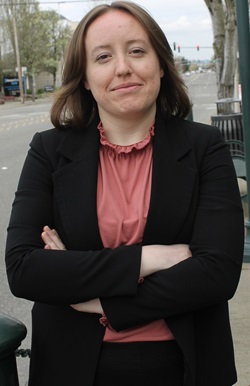
Kim La Fronz, an attorney at DPD, has handled several post-conviction cases.
A big driver of mass incarceration in the United States is the harshly punitive nature of our system – a system that imposes much longer prison terms on people than almost any other country in the world, which in turn worsens the already racially disproportionate nature of incarceration.
Community partners and DPD have pushed hard to lessen these harms, working to make the system less punitive through legislative and appellate work. The result is a change in practice at the Department of Public Defense: In 2021, attorneys handled far more post-conviction cases than in previous years. Clients have seen their prison terms get reduced; some have walked free.
“This is really powerful work,” said David Montes, a felony attorney at DPD. “We’re able to help people go home to their families – people who have been sitting in cages for a long time.”
Kimberly La Fronz, a DPD felony attorney, has also witnessed the profound impact of a resentencing hearing, where clients have had years shaved off their sentence. In one instance, when the judge issued a new sentence, her client’s whole family applauded. “It’s deeply gratifying,” she said. “These are cases where we get to undo some of the harm of the system.”
This post-conviction work is the result of several developments.
The most significant change in law came from State v. Blake, the State Supreme Court’s February 2021 ruling that found our state’s felony drug possession law unconstitutional. This meant that hundreds of people serving sentences made longer because of possession convictions could see their sentences reduced or could even be released. Other clients have been able to get their community custody obligations vacated. Many others are seeing their possession convictions vacated from their records, giving them a better chance at jobs, housing, education, and more. In 2021 alone, DPD assigned 730 Blake-related cases to attorneys in our divisions.
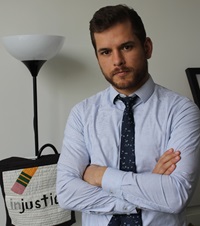
The State Supreme Court, recognizing that young people’s brains are still developing, also required judges to consider the age of a defendant when making sentencing decisions. In a constellation of opinions – starting with State v. Zyion Houston-Sconiers and then made retroactive by In re Personal Restraint of Ali and its companion case, In re Personal Restraint of Domingo-Cornelio (235KB) – the State Supreme Court said that trial court judges could consider the mitigating circumstances of youth when sentencing young people adjudicated as adults.
In 2 combined cases – In re Personal Restraint of Monschke and In re Personal Restraint of Bartholomew (276KB) – the State Supreme Court built on its Houston-Sconiers’ opinion, overturning mandatory Life Without Parole (LWOP) sentences for clients who are 18 to 20 years old. DPD attorneys have represented nearly 50 people who qualified for resentencing under these high court rulings.
Legislative changes also helped to address long sentences. ESB 5164, which went into effect last year, ended Robbery 2 as a “strike” offense under our highly punitive “three strikes” law, which leads to LWOP sentences. DPD attorneys represented 20 people in 2021 who were resentenced as a result.
Long sentences, “a form of torture,” Montes said, continue to weigh heavily on people in Washington. “It’s inhumane to make someone live in a cage for so many years.”
Still, he’s encouraged by these changes in law and the glimmers of hope they’ve offered people.
“One of the things that I find inspiring is how resilient our clients are. Our clients in prison have been through so much and yet they still keep fighting in the face of horrible circumstances,” he said.
Youth right to counsel: Helping young people understand their rights in the face of a coercive system
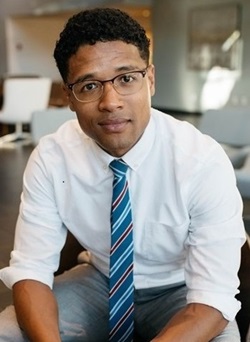
Matt Sanders, an attorney at DPD who works with young defendants, said the new youth right to counsel law has made a difference.
James Coatsworth, an attorney at DPD, recalls a recent phone call he took from a Bellevue Police Officer, who had just detained a young person in his bedroom. The youth, who had been read his Miranda rights, was about to answer the officer’s questions when James interjected.
“I advised him that he didn’t need to speak with the police and that it was likely not in his interest to do so right then,” James said. “He understood and decided he did not want to speak to the police.”
The young person, James added, seemed nervous about his interaction with the officer. “Consulting with a lawyer clearly helped him navigate the interaction in a way that protected his constitutional rights.”
Such is the power of the state’s new youth right to counsel law, championed at both the local level and in the legislature by DPD and several partners.
The youth right to counsel ordinance was first adopted by the City of Seattle and King County in 2020 after more than a year of work, strong community partnerships, and a concerted push by advocates who care deeply about young people. Even in the face of a strongly worded letter in opposition by the King County Prosecutor, the King County Sheriff’s Office, and the Seattle Police Department, both the city council and county council passed the measures unanimously.
Last year, DPD brought the issue to the state and convinced lawmakers to adopt ESHB 1140 – a statewide version of the law and a groundbreaking effort. This effort was also widely supported by community members who believed that the right to counsel for young people was a necessary protection. The law is one of the strongest statewide youth right-to-counsel requirements in the country.
Both the local ordinance and the statewide law require law enforcement to connect a youth (under 18) with a lawyer before they conduct a custodial interrogation, when they detain a youth based on probable cause of criminal activity, or when they request that the youth consent to a search of their person, property, or vehicle. Consultation with a lawyer can be by phone or in person.
The legislation is informed by research that shows youth don’t fully comprehend their rights or understand the consequences of waiving them, making them particularly vulnerable to coercive police tactics. Some studies show that youth waive their Miranda rights at rates as high as 90 percent. The laws also help to address the profound racial disproportionalities in our criminal legal system. Black youth, Indigenous youth, and youth of color are arrested, prosecuted, and incarcerated at much higher rates than white youth in Washington state. Black youth are almost four times more likely to be adjudicated than would be expected based on the youth population of Washington.
“These reforms mean youth who are scared, confused, and vulnerable when stopped by police now receive critical legal advice,” said Anita Khandelwal. “Studies show that youth don’t fully understand the consequences of waiving their rights. The protections now in place are essential in ensuring our youth are treated fairly.”
Matt Sanders and Anu Zangri, public defenders who work in DPD’s juvenile units, have represented young people who talked to lawyers before talking to the police, thanks to the new law, and have seen the difference it has made for their young clients.
“It’s such a significant innovation in the law, more protective than almost anything else on the books,” Matt said.
Anu sounded a similar note. “It takes some power away from law enforcement,” she said, which in turn “makes the youth feel far more at ease and achieve a better outcome.”
A new victim compensation fund helps address the harm and impact of the criminal legal system
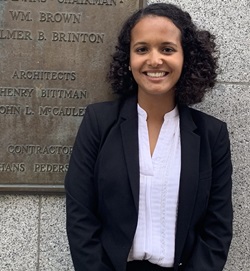
Attorney Mahalia Kahsay said she represented many clients in Seattle Municipal Court who struggled to make restitution payments.
Court-imposed restitution, like other financial legal obligations, deeply harms our clients. Black people in Seattle and King County are far more likely to face restitution requirements than white people, indebtedness that can keep people ensnared in a cycle of poverty and incarceration.
Over the past few years, DPD has worked closely with community partners to address this issue, and in 2020 and 2021, we marked two significant accomplishments: King County became the first county in the country and the City of Seattle the first city in the country to establish publicly supported restitution/victim compensation funds.
The county program is part of a new effort called Restorative Community Pathways, which partners with youth and victims to address needs and provide support. Centered on healing rather than punishment, RCP was approved by the King County Council in 2020 after a concerted push by DPD and a coalition of community groups. Among other measures, it provides immediate compensation to harmed parties. According to the national Fines & Fees Justice Center, King County was the first jurisdiction in the country to provide a publicly supported restitution fund.
This initiative was followed by a pilot Victim Compensation Fund that the Seattle City Council approved in November 2021. Several agencies and organizations, including DPD, CHOOSE 180, Public Health – Seattle & King County, and Seattle City Attorney’s Office, advocated for the new fund as part of their participation in a national leadership network led by Cities and Counties for Fine and Fee Justice (CCFJ).
The Seattle City budget item also asks the Seattle City Attorney’s Office to explore some policy changes requested by the fines and fees work group that could help our clients and to report back to the city council on how they plan to implement policy changes and the impacts of having a Victim Compensation Fund.
Katie Hurley, DPD’s special counsel for criminal practice and policy, said these reforms are badly needed to address the harm and disproportional impact of the criminal legal system. Research shows that between 2018 and 2021, people who identified as Black were, per capita, 3.9 times more likely than people who identified as white to face restitution requirements by Seattle Municipal Court. In King County, research shows Black youth, Indigenous youth, and youth of color are also vastly over-represented in the system; in 2019, 72% of the youth prosecuted and 86% of the youth incarcerated in King County were BIPOC youth.
“Imposing restitution disproportionately harms people experiencing poverty and BIPOC communities, while doing little to help victims,” Katie added. “These two funds are much-needed steps in the right direction and, we hope, an inspiration to other communities grappling with these issues.”
Mahalia Kahsay, an attorney who recently practiced in Seattle Municipal Court, said she witnessed the profound difference the new fund made in her clients' lives. She recalls clients who sold household items so they could make their restitution payments and others who came into court over and over again, making small payments even while struggling to pay rent.
"This new fund in Seattle helps everyone involved in the system," she said. "It means that restitution is no longer stopping cases from resolving. Victims can get compensated, and clients can focus on moving on with their lives."
DPD and partners work to achieve a fairer and stronger inquest process
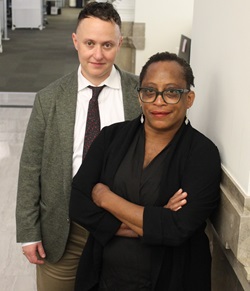
La Rond Baker and Adrien Leavitt, attorneys at DPD, represented the family of Damarius Butts, who was killed by police in April 2017.
In a significant win for families whose loved ones have been killed by the police, the State Supreme Court last year issued a far-reaching opinion that strengthens the inquest process. It gives families stronger tools to investigate the death of their loved one, increases accountability by requiring officers who kill community members to testify, allows the jury to consider whether the officer who killed a community member engaged in criminal conduct, and struck down several demands by law enforcement.
The lawsuit was brought on behalf of three families whose loved ones were killed by police: Damarius Butts, who was 19 and the father of a 1-year-old daughter at the time of his death; Isaiah Obet, who was shot in the head by Auburn Officer Jeff Nelson, who has since been charged with murder for killing a different community member; and Charleena Lyles, a pregnant mother of four, shot in front of her 1-year-old child. La Rond Baker, DPD’s special counsel overseeing our affirmative litigation work, and Adrien Leavitt, a DPD attorney, represent the Butts family; Amy Parker and Susy Sobel, two other DPD attorneys, represent the Obet family. A private attorney represents the family of Charleena Lyles. La Rond coordinated the complex case and argued on behalf of all three families before the Supreme Court.
The high court affirmed every issue that mattered to us. In their unanimous 49-page opinion issued on July 15, 2021, the justices said officers who kill a community member can be required to testify in court about what happened and that the inquest jury can consider whether the officer acted with criminal means – two of the demands made by our clients. The court also struck down nearly all of the challenges made by law enforcement agencies, including the King County Sheriff’s Office, challenges that would have severely limited the scope and transparency of the inquest process.
In a message to staff the day the decision was handed down, Anita Khandelwal called the opinion “a powerful repudiation of law enforcements’ impunity for killing community members.” But she also noted that it was a bittersweet victory. “It means greater police accountability when a community member is killed by law enforcement, but it doesn’t bring back these three community members, nor the many other people – most of them BIPOC – who are killed each year by police officers.”
The decision opened the door to several inquests that have been put on hold due to the legal challenges. This year, that work continues. DPD is representing four families in the inquest process; many more law enforcement-related deaths have been referred to the Executive Office for an inquest. Though an inquest is deeply painful for families, it helps that King County’s inquest process is more fair, thorough, and likely to produce reliable results, La Rond said.
“Families are devastated and traumatized when they lose a loved one to police violence. Fair and transparent inquests help answer unresolved questions and in doing so help nurture a path towards healing and accountability,” she said.
Freedom Project helps DPD work towards a shared understanding of structural racism
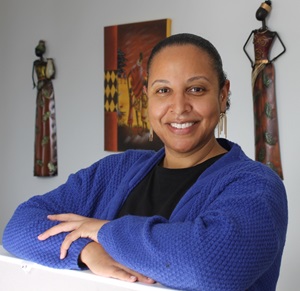
Nina Elmore, a mitigation specialist supervisor, said the Freedom Project workshops were powerful.
One of our department’s strategic objectives is to create “a culture of mutual respect and support” in our workplace. In 2021, we gave meaning to those words by holding a series of thoughtfully crafted workshops that enabled staff to explore structural racism as it exists in the community and in our workplace.
More than 200 employees participated in these non-mandatory sessions, developed and led by David Heppard and Lauren Ephriam of the Freedom Project. The purpose of the work was to examine the many ways structural racism shows up in our workplace and our relationships and to deepen our understanding of how race affects our lives. Ideally, David and Lauren said, such conversations can help us reflect on our attitudes and experiences and begin the hard work of change.
Many said they found the work meaningful.
Nina Elmore, a mitigation specialist supervisor, said she was initially skeptical. As a Black woman, she feared she and other employees of color would be expected to share their experiences of racism while their white colleagues passively listened.
And indeed, when the facilitators showed video footage of Rodney King being beaten by white officers, Nina felt waves of emotion, recalling the impact of seeing that footage for the first time as a high school student in Seattle. But in large part because of David and Lauren’s strong facilitation, she felt supported in her two sessions, support David strongly encouraged. "The sessions were raw and real," she added. “Nothing was sugarcoated.”

David Heppard of the Freedom Project co-facilitated DPD's sessions.
Karri Ridgeway, an attorney in another division, also found the sessions meaningful. “I think a lot of us thought it would just be another training on client communication, and it was not. They made it clear that structural racism impacts every relationship you have,” she said. In the months following her sessions, Karri, who is white, said she found herself more aware of her privilege and more mindful of the assumptions she brings to her conversations with colleagues. The sessions also strengthened her work with clients. “It helped me think about how I can talk to my clients in a way that shifts the power back to them.”
DPD Director Anita Khandelwal said the department could not have found better facilitators than David and Lauren. “We’re grateful to have members of our community who are willing to guide and support us in this critical work,” she said. She’s also hopeful the department will be able to continue this process. “You can’t attend a couple of sessions and say you’re done, you’re no longer racist,” she said. “It has to be ongoing.”
Nina agreed. The sessions have enabled her to have better conversations with her supervisor about the emotional impact of her work – the fact that so many of her clients are, like her, people of color. And she feels she’s in a better position to support the people she supervises, especially employees of color. “I’m excited that the Freedom Project was able to work with us, and I would like to see this work continue. It’s beneficial for everybody.”
Helping clients by giving them the tools they need to stay in touch
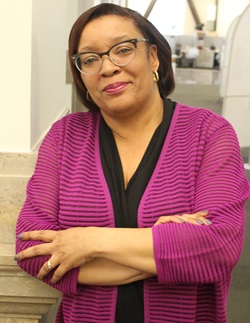
Stephanie Sellers, an administrative supervisor at DPD, has helped distribute the prepaid cell phones to attorneys in her division.
Public defender Tommy Smith calls the prepaid cell phones he’s been able to give to clients “life-changing.” Thanks to the simple gift of a phone, clients have been able to attend court hearings, apply for jobs, get into treatment, and access benefits. It’s also meant Tommy could stay in touch.
“It’s a tool that we need in order to be there for our clients,” he said. “It’s helped us to develop a relationship, to show them we really mean it when we say we’re here to help them.”
The phones that he and other public defenders have been able to hand out to clients this past year are due to a grant DPD received from the state Department of Commerce. The $218,988 grant covers the cost of 500 prepaid phones, refill cards, and portable chargers; it also has paid the salary of one full-time Spanish-language interpreter, who worked for DPD last year. DPD was one of six agencies – out of 74 that applied – to receive the grant.

DPD attorney Tommy Smith said cell phones proved vital to his clients this past year, with the courts' heavy reliance on video hearings.
Before distributing the phones, staff at DPD downloads the Zoom app onto the phones; the phones also come with unlimited text, talk, and data. To receive a phone, a client must attest to their attorney that they don’t have a phone or don’t have one that has the technological capacity for video conferencing; they also have to say they’ll use the phone to stay in touch with their attorney. They don’t need to return the phone at the end of their case.
Tommy says the phones have been particularly vital this past year, when video hearings have become commonplace. Clients on the other side of the technological divide have suffered more than most this past year; those who can’t stay in touch with their defense team or attend court hearings often end up facing warrants for their arrest, he said.
One of Tommy’s clients was able to be released from jail onto electronic home detention because of the phone. Another was able to participate in treatment. Liza Parisky, another public defender, said she was able to stay in touch with a client experiencing homelessness after she gave him a phone. “It definitely helped him avoid a warrant because I otherwise would not have known how to get in touch with him,” she said.
Stephanie Sellers, an administrative supervisor at DPD, has helped distribute the phones, sometimes passing them on to attorneys, sometimes directly to clients. It's been deeply gratifying work, she said. "A lot of our clients don't have phones. They can't afford them. They're thrilled when we can give them one."
Budget advocacy: Fighting to ensure our department can provide quality representation
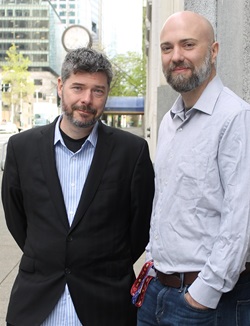
Gordon Hill, DPD's deputy director, and Stev Weidlich, research and data analyst, have played lead roles in producing data needed to inform our budget discussions.
As a department, our goal is to see resources diverted from the criminal legal system and reinvested in programs that support people and communities. We want to see the footprint of this harmful system shrink, not grow. At the same time, it’s imperative that public defense is well-resourced and fully staffed and that we’re able to keep up with the demands placed on us by those agencies further upstream in the system. Parity is essential in helping to ensure quality representation for our clients.
To that end, we engaged in budget advocacy and launched new practices in 2021 – all with an eye to trying to ensure DPD has the resources and staff to meet the ongoing needs of our clients and to reduce the size of our attorneys’ sometimes staggering caseloads. Here are a few highlights.
Last summer, the County Executive sought a $30 million supplemental appropriation for the criminal legal system to address COVID-related backlogs. Anita Khandelwal told the County Council to “proceed with caution and care” before investing more funds into a system that is racially disproportionate and harmful to BIPOC communities. At the same time, she said, she supported the Executive's proposal, since it gave approximately similar resources to all three entities involved in the criminal legal system (our department, the prosecutor’s department, and the judiciary).
We also successfully advocated for the ability to hire third-year law students within a two-week window, even if it pushes us above our allowed employee (or FTE) cap. This helps to ensure we can hire some of the best students and brings an equity lens to this process. Previously, we made offers to third-year students with a start date within a five-month window, based on openings that we expected would occur. But this disadvantaged students with limited financial resources and disadvantaged DPD when trying to attract strong candidates. Now, we can offer 3Ls a start date within two weeks of their acceptance, pending passage of their Bar exams.
Another issue we’ve faced is the need for greater flexibility in hiring. Filings, driven by the prosecutor, often spike, creating situations that are untenable for our caseload-carrying attorneys. To address such fluctuations, DPD in 2020 successfully advocated for an “FTE trigger,” allowing us to hire an additional career service attorney each time the number of assignments to DPD exceeds, for two months in a row, the equivalent of a single attorney’s caseload. We did not have to use this tool in 2021 – filings fell slightly last year – but we believe it will prove helpful if filing spikes occur again.
Finally, in 2021 we established a contract with outside counsel to take on cases when our attorneys are at capacity – an innovative approach to ensure those clients we can’t help in-house due to high caseload levels receive quality representation by outside attorneys.
We also made clear that these additional funds should be used to address the backlog – the number of clients languishing in jail – rather than empowering the prosecutor to file hundreds of new cases.
Ultimately, DPD received an additional $10.7 million to increase staffing and another $5.7 million to address new post-conviction work. In a better world, this money would have gone to housing, health care, and community-based organizations that meaningfully support our clients, and we continue to push for budgets that shrink the size of the criminal legal system and invest in programs that help rather than harm communities.
Even with additional hiring flexibility and other tools, DPD’s defense teams faced high caseloads in 2021. "Filings were down last year, but due to the pandemic and the court delays it caused, our attorneys – especially those in our felony units – have had to carry far more open cases, adding to sometimes staggering caseloads," said Gordon Hill, DPD's deputy director. The department continues to advocate for the development of a more accurate and realistic staffing model that reflects the current state of indigent defense, as well as other tools that can support our defense teams in achieving more manageable workloads. And we continue to advocate for programs and policies that shrink the size of a system that is harmful, racist, and ineffective.

 Translate
Translate